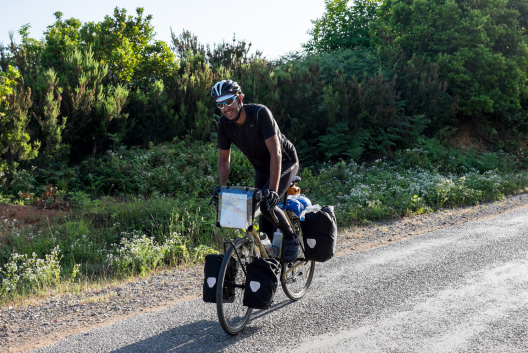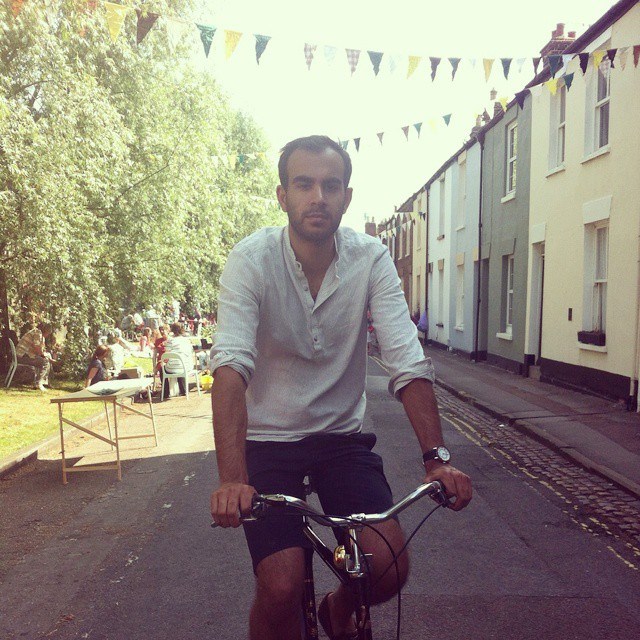ASTANA – Shayl Majithia is one of the most recent in a long line of travellers to pass from Europe to Asia via Kazakhstan’s great landmass. Like his earliest predecessors, Majithia’s journey is self-propelled; unlike them, he comes not for trade or other gain, but for charity. Plus, he’s got a sweet bike.
“I am cycling to see the world, to experience different cultures and also to raise some money for AgeUK,” Majithia, 28, told The Astana Times in an email interview on July 13. “I have chosen this charity because old age affects almost everyone, with people suffering from illnesses, not having enough money or simply not having anyone to look after them in their old age; it is becoming more and more important for elderly people to have support.”
His planned route, from his website www.offonmybike.com, began in the U.K. and continued through Europe, then via Georgia and Azerbaijan to Kazakhstan, which he first reached via ferry on July 8. He’ll cycle through much of Central Asia, then to China, then Southeast Asia and across the Atlantic to South America. It’s a long, long trip.
In Kazakhstan, Majithia was to see the Mangystau and Almaty oblasts. “The reason to cycle [through Mangystau] is for the challenge of the winds, heat and my interest in spending time in a sparsely populated, isolated and peaceful part of the world,” he wrote. “The area has more than lived up to the expectations, particularly the challenging road quality and weather conditions and the beautiful scenery of the Kazakh Steppe, particularly the region after Shetpe.” Aktau was also a surprise, he said. “I did not expect such a beautiful beach and I even went for a quick swim in the Caspian Sea, a highlight not only of Kazakhstan, but of my entire journey.”
In his other life, the one back in Oxfordshire, Majithia is a maths teacher at a secondary school and sixth form in Oxford. He’s been granted a sabbatical for his round-the-world cycling trip, he said.
An active Twitter user, Majithia has been using social media to keep track of news from the countries on his route. A question and answer session with Kazakh Minister of Foreign Affairs Erlan Idrissov came at an ideal time for the traveller, who used the #ASKMFAKZ hashtag to learn if Kazakhstan’s visa-free programme for U.K. citizens would still be in effect when he arrived. “The Q&A session solved my problems and questions which couldn’t be answered through any of the government websites of the U.K. or Kazakhstan,” he wrote. It was also invaluable when he ended up on his way to Tbilisi just behind the June floods that so damaged the city.
Being armed with information was helpful when Majithia arrived in Kazakhstan by cargo ship from the Caspian, an unusual entry route into the country. “Crossing the border into Kazakhstan was quite an interesting experience,” he wrote. “Arriving into the port was a strange process where security was tight but there was definitely confusion on what correct procedure was and how to deal with cyclists. Documents that don’t exist were asked for and what should have been a fairly straightforward passport and customs check took an hour, despite there only being seven travellers.”
Most of Majithia’s information on travelling in Kazakhstan comes from the blogs of other travellers – because that’s about all there is. “Kazakhstan is definitely not known in the West as a tourist destination and is more common associated with the history of the Silk Road or the oil industry. I myself knew very little of the country until arriving,” he wrote.
He was warned to beware of attempted shakedowns by port and other officials, which he said he witnessed. Having done his research, including being one of the few foreigners to participate in the MFA Twitter session, he was able to stand his ground and refuse to pay for unnecessary services. That experience, and having equipment stolen from his bike outside a tea house, have not been highlights of his time here.
However, those events are only part of a larger story, Majithia wrote. “Despite the negative things, I still love Kazakhstan. The people are generally friendly, welcoming and interested in tourists; they often want to help you find somewhere to stay, although there are never any prices anywhere so I never know whether I’m being helped or conned.”
The traveller has noticed the treatment of the elderly on his journey. “When I was in Georgia, I stayed with an imam in Batumi and a bishop in Tbilisi. Both had their mothers living with them: they said that generally this was the case in the Caucasus region,” he said. “This is a contrast to the U.K., where most families would not be able to afford or have space for their elderly relatives, which means that they are left to look after themselves.”
The Poverty Site, a U.K. website providing statistics on poverty, says that around 20,000 more people aged 65 or over in England and Wales die in winter months than in other months. This would be reduced if the elderly had better support networks, Majithia said. “I also noticed that there were a lot of elderly people begging in the Caucasus. Clearly growing old is difficult everywhere in the world.”


